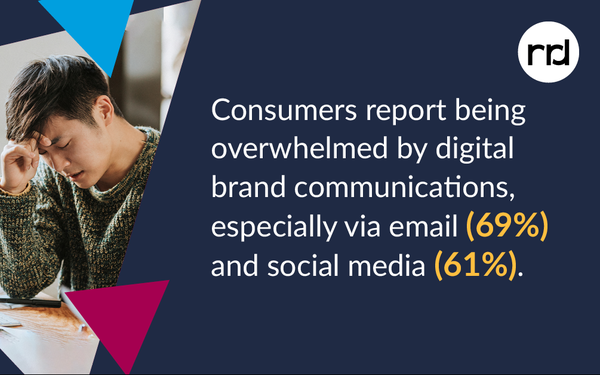Commentary
Make It Stop: Consumers Say They're Overwhelmed By Digital Messaging
- by Erik Oster , January 26, 2024

Global marketing and commercial print company R.R. Donnelley Sons & Company (RRD) recently published its “Modern Marketers” report, examining marketers’ channel preference and consumer sentiment. We caught up with Stefanie Cortes, director, strategic analysis, direct marketing at RRD, to discuss the findings.
This interview has been edited for length and clarity.
CPG Insider: What shifts are you seeing in which channels brands use – and why?
Stefanie Cortes: Given market challenges, digital fatigue and privacy concerns, marketers are looking for ways to prove the value of their campaigns, which is why many are now turning to “tried and true” channels, including direct mail, since the digital landscape is becoming increasingly crowded, making it harder for brands to stand out.
While brands are still leveraging digital channels for their marketing efforts, we’re finding that the impact of these communications is softening among consumers overall. In our report, we found that consumers reported being overwhelmed by digital brand communications, including 69% by email and 61% by social media (61%). Additionally, one in five consumers report having deleted a social media account in the last year, and nearly half (46%) are more cautious about sharing personal data online.
CPG Insider: What survey results are especially pertinent to CPG brands?
Cortes: Our survey found that 74% of shoppers agreed they spent more time researching before purchasing over the course of the past 12 months, which shows consumers are also dedicating more time to finding the best products and deals.
For CPG brands, this data demonstrates the importance of adapting to changing consumer shopping habits by offering cost-efficient products, implementing effective discount strategies and prioritizing customer loyalty initiatives. The concept of a "cost-efficient brand" and the consumer preference for it is only going to gain increasing momentum. The survey results demonstrate this, with 78% of consumers reporting that they were shopping in fewer stores, switching to more cost-efficient brands, and using customer loyalty or rewards programs more often.
CPG brands need to navigate economic uncertainties and align their strategies with the evolving preferences of cost-conscious consumers in order to foster loyalty and maintain market competitiveness.
CPG Insider: Inflation seems to be on the decline, but how is previous inflation and ongoing cost-of-living pressures influencing consumer behavior? How can brands best respond?
Cortes: Eight out of 10 consumers report being impacted by inflation over the past 12 months. In addition, nearly half (49%) expect to spend less on dining out, events, and leisure activities over the next 12 months. With tightened budgets, consumers are likely to be shopping at fewer stores and switching to more cost-effective brands— challenging the status quo when it comes to customer loyalty.
Brands should consider meeting customers where they’re at and revamping loyalty programs, discounts and promotions to help them maximize their purchases as they shop. Our report also found that over 40% of consumers expect to use discounts and promotions more often than last year, indicating an opportunity for brands to deliver what consumers are looking for.
If inflation pressures continue to ease, consumer behaviors may evolve once again, which means that brands should be prepared to continue adapting their marketing strategies.
CPG Insider: What do you think is contributing to Gen Z being less likely to weigh sustainability factors in purchasing decisions, as found by this survey?
Cortes: Gen Z's lower inclination to weigh sustainability factors in the survey compared to millennials may be influenced by a prioritization of other elements, including product value, brand reputation and whether employees are treated fairly.
While our survey offers a glimpse at this demographic’s shift in values, brands should avoid assuming that Gen Z doesn't care about sustainability, and instead recognize the nuanced priorities of this generation.


